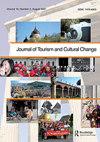中介式反旅游话语中的民粹主义:纪录片《游客回家吧!》
IF 2.5
4区 管理学
Q2 HOSPITALITY, LEISURE, SPORT & TOURISM
引用次数: 2
摘要
摘要本文从批判性话语的角度,对纪录片《旅游者回家!这产生了一种民粹主义的反旅游话语,其中旅游业是从文化和经济焦虑的角度来构建的。文化焦虑是基于对许多流动的“他人”到来所威胁的人和地方的危险建构,并呼应了右翼民粹主义的典型反移民话语;相似之处还体现在话语策略上,如灌输恐惧、赞扬过去、反对我们当地人与他们、个性化他者以及危险隐喻、量化和排他性指示等手段。经济焦虑建立在赢家和输家的建构之上,与左翼民粹主义话语产生共鸣,后者主张财富再分配和民众主权;相似性涉及话语策略,如反对我们/失败者/人们对他们/胜利者/精英;歌颂人民,蔑视精英;使他人人格解体;以及隐喻、限定和包容性指示等手段。分析还揭示了这种反旅游话语的意识形态困境,包括与世界主义的冲突关系、城市权利的不对称、游客作为资源的经济概念、外群体(精英)的横向(其他地方)和纵向(上方)位移,以保护内群体(人民)的同质性和包容性。本文章由计算机程序翻译,如有差异,请以英文原文为准。
Populism in mediated anti-tourism discourse: a critical analysis of the documentary tourist go home!
ABSTRACT From a critical discursive perspective, this paper analyses the documentary Tourist go home! which produces a populist anti-tourism discourse, in which tourism is framed in terms of cultural and economic anxiety. Cultural anxiety is based on the construction of danger for people and places threatened by the arrival of many mobile Others and echoes anti-immigration discourse, typical of Right-wing populism; similarities can be seen also in terms of discursive strategies such as instilling fear, praising the past, opposing we-locals vs them, personalizing the Other and devices such as metaphors of danger, quantification, and exclusive deixis. Economic anxiety is based on the construction of winners and losers and resonates with a Left-wing populist discourse reclaiming wealth redistribution and popular sovereignty; similarities concern discursive strategies such as opposing we/loser/People vs them/winners/Elite; praising the People and despising the Elite; depersonalizing the Other; and devices such as metaphors, qualification, and inclusive deixis. The analysis also revealed the ideological dilemmas of this anti-tourism discourse, including the conflicting relationship with cosmopolitanism, asymmetry in the right to the city, an economic conception of tourists as resources, the horizontal (elsewhere) and vertical (above) displacement of the outgroup (Elite) to preserve the ingroup (People) homogeneity and inclusiveness.
求助全文
通过发布文献求助,成功后即可免费获取论文全文。
去求助
来源期刊

Journal of Tourism and Cultural Change
HOSPITALITY, LEISURE, SPORT & TOURISM-
CiteScore
5.10
自引率
9.10%
发文量
31
期刊介绍:
Journal of Tourism and Cultural Change ( JTCC ) is a peer-reviewed, transdisciplinary and transnational journal. It focuses on critically examining the relationships, tensions, representations, conflicts and possibilities that exist between tourism/travel and culture/cultures in an increasingly complex global context. JTCC provides a forum for debate against the backdrop of local, regional, national and transnational understandings of identity and difference. Economic restructuring, recognitions of the cultural dimension of biodiversity and sustainable development, contests regarding the positive and negative impact of patterns of tourist behaviour on cultural diversity, and transcultural strivings - all provide an important focus for JTCC . Global capitalism, in its myriad forms engages with multiple ''ways of being'', generating new relationships, re-evaluating existing, and challenging ways of knowing and being. Tourists and the tourism industry continue to find inventive ways to commodify, transform, present/re-present and consume material culture. JTCC seeks to widen and deepen understandings of such changing relationships and stimulate critical debate by: -Adopting a multidisciplinary approach -Encouraging deep and critical approaches to policy and practice -Embracing an inclusive definition of culture -Focusing on the concept, processes and meanings of change -Encouraging trans-national/transcultural perspectives
 求助内容:
求助内容: 应助结果提醒方式:
应助结果提醒方式:


